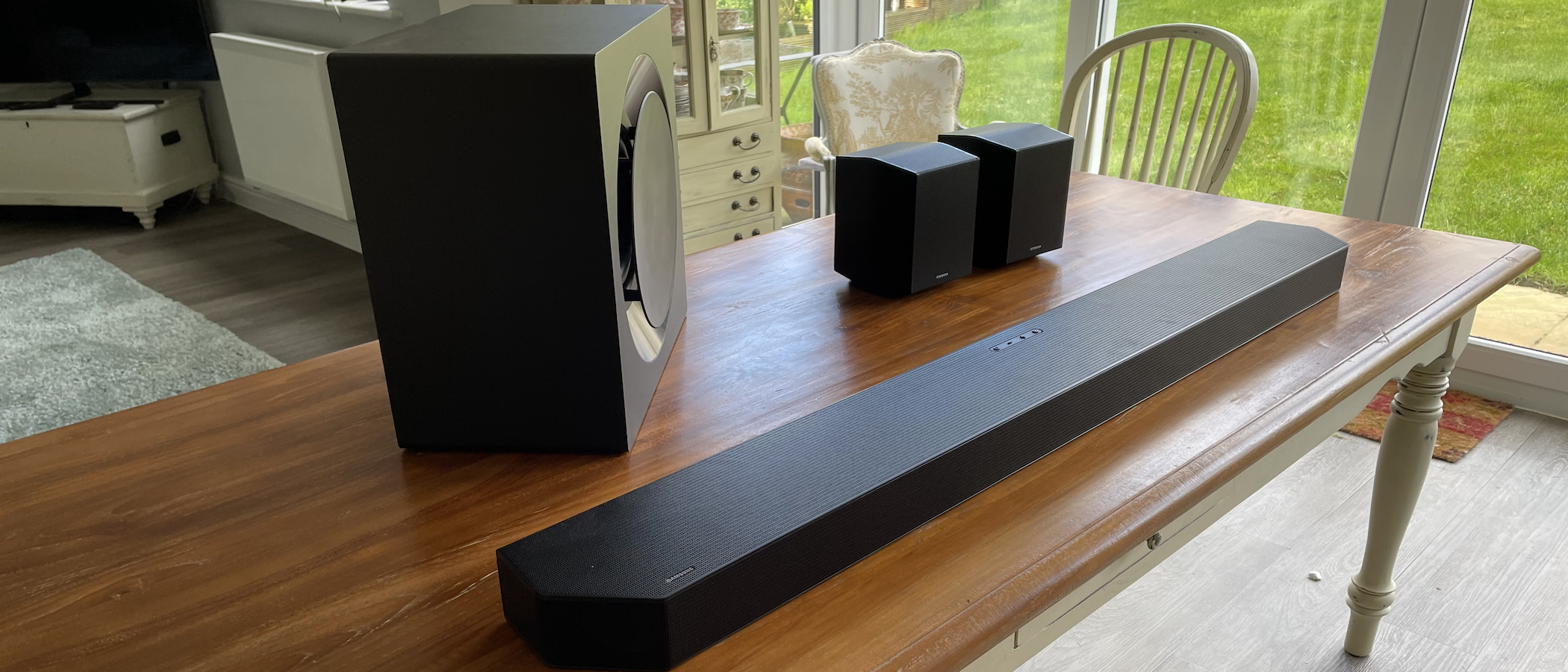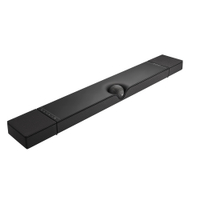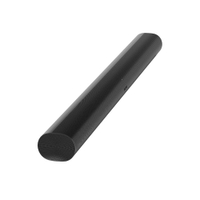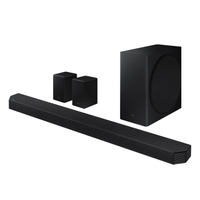TechRadar Verdict
The Samsung HW-Q990B has no right to deliver the amount of power, precision and soundstage craft it does from just four speakers. Basically, if you want the sound of a talented separates system but without the cables and clutter, your search stops here.
Pros
- +
Fantastic Dolby Atmos sound
- +
Remarkably compact speakers
- +
Good connectivity
Cons
- -
It’s not cheap
- -
No 4K 120Hz/VRR passthrough
- -
Music could sound better
Why you can trust TechRadar
Samsung HW-Q990B: One-minute Review
The Samsung HW-Q990B continues the company's recent tradition of giving its flagship soundbar four physical boxes – but until now, Samsung has consistently managed to increase the number of channels squeezed into those four boxes. This year, the total channel count has stuck at 16, just like last year, leaving Samsung to rely on other improvements to keep its soundbar story moving forward.
Happily, the Samsung HW-Q990B's improvements are all focused on improving the sound quality those 16 channels deliver, making it one of the best soundbars of the year. The subwoofer, for instance, sports a fancy new Acoustic Lens over its hefty 8-inch driver to make bass more smooth and refined, while the rear speakers feature a new angled top and small pedestal stands to deliver purer and better-positioned effects.
Samsung has finally introduced an auto-calibration system to its latest flagship soundbar too (also seen in the impressive-sounding Samsung HW-S800B) making it much easier to get the best from its peerless channel count. You can even get it to join forces with the speakers in many of Samsung’s latest TVs for an even bigger soundstage.
But as this Samsung HW-Q990B review will reveal, it doesn't need any help. By adding new control, balance and precision to the vast power and channel counts its predecessors have become renowned for, the Q990B creates the most fully rounded and immersive surround sound experience we’ve ever heard from even the best Dolby Atmos soundbars.
Samsung HW-Q990B review: price and release date
- Released in May 2022
- Launched at $1,899 / £1,599 / AU$2,199
The Samsung HW-Q990B’s price certainly puts it at the high end of the soundbar market. It launched at pretty much the same price as its successful predecessors, though, despite introducing a few key new features – and, like other Samsung soundbars, the cost has dropped now that the HW-Q990B has been out for a few months.
It offers four components, too, as well as a peerless channel count and power in spades, when there are a number of one-bar, hi-fi-oriented soundbars out there that cost even more, such as the Devialet Dione and Sennheiser Ambeo.
You can spend a lot less on a soundbar, but at the level this is aimed at, the price is in line with similarly featured models from the competition such as the LG S95QR.
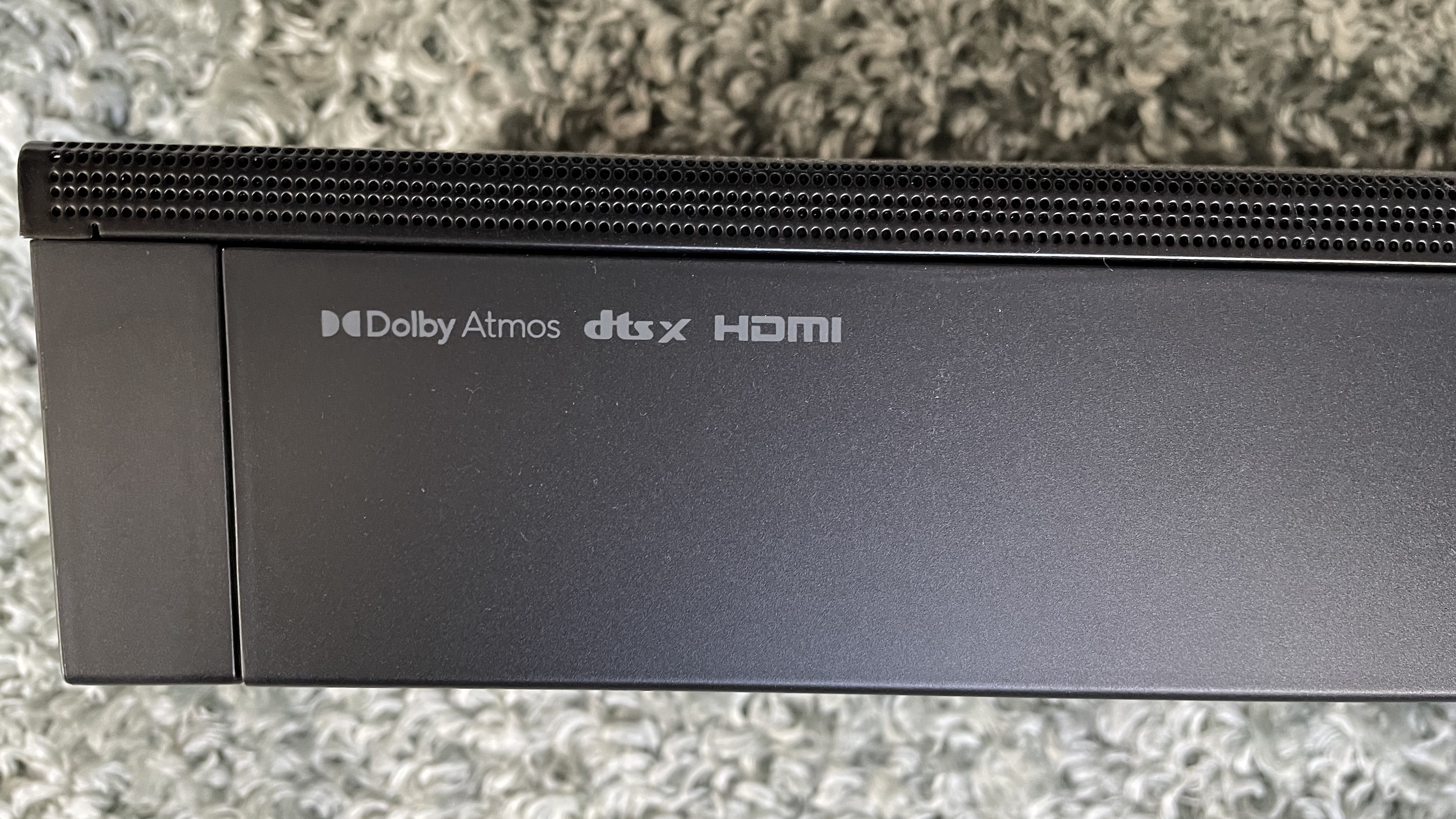
Samsung HW-Q990B review: features
- 11.1.4 channel count
- Comprises four separate elements
- Dolby Atmos and DTS:X playback
The HW-Q990B stretches the notion of soundbar about as far as it can go. After all, alongside the main soundbar and external subwoofer combination that represents the furthest extent of most soundbar ambitions, the Q990B also ships with a pair of wireless rear speakers.
These are no ordinary rear speakers, either, since despite their relatively compact dimensions each of them manages to house no less than three separate channel drivers. One firing out of their front as you would expect, but also one firing out of their top edges for Atmos heigh, and another firing out of their outer sides.
These drivers contributed to a class-leading (at the time of writing) channel count of 11.1.4. So that’s front center, front left, front right, side left, side right, front side left, front side right, rear side left, rear side right, rear left, rear right, the subwoofer’s bass channel, and four upfiring drivers to provide Dolby Atmos’s overhead/height effects. Phew.
As well as looking good on the Q990B’s spec sheet, there is, of course, a potential massive sound quality benefit to supporting so many ‘real’ (rather than virtual/created by processing) channels of sound. Namely the creation of the sort of perfect hemisphere of sound that’s the ultimate goal of the latest and greatest Dolby Atmos and DTS:X sound formats – even if those channels do still require some clever bouncing to get them around you.
The Q990B is not the first 11.1.4-channel soundbar. That honor actually belongs to its predecessor, 2021’s Samsung HW-Q950A. So how does the Q990B turn Samsung’s soundbar dial up to 11(.1.4)?
The most instantly noticeable difference is the addition of an Acoustic Lens to the chunky (chunkier than last year’s model, in fact) subwoofer. This sees a raised cover with open sides sitting over a promisingly large 8-inch driver, with the intention of improving the dispersion and refinement of the bass sound.
The rear speakers have undergone a redesign, too. In particular, their top edges now angle down to aid the directionality of the up-firing drivers, and their main cabinets now sit on short ‘feet’ to reduce potential sound colouration from whatever furniture or shelf you’ve got them sat on.
Samsung has also tweaked elements of its audio processing to improve sound quality, especially when it comes to upmixing sources with limited native channel counts (including stereo music) to take advantage of the system’s full 16-channel capabilities.
The Q990B finally sees Samsung adding a proper built-in auto calibration system to its flagship soundbar for the first time, too. This ‘Space Fit’ feature uses the soundbar’s mics to analyse how the sound is responding to your room shape and contents, and apparently re-runs itself every day, just in case you might have moved your coffee table, sofa or whatever around overnight. It’s backed up by an Auto EQ system, too, that monitors the way the subwoofer’s bass output gels with the rest of the sound.
In the unlikely event that the Q990B’s 16 channels of sound aren’t enough for you, Samsung has also improved its so-called Q-Symphony feature, whereby the soundbar can join forces with the speakers inside some of Samsung’s premium TVs. This now makes it possible to up the full channel count of a Samsung TV/Q990B soundbar combi to 22.
The Q990B’s connectivity is mostly impressive. Particularly good to see is an HDMI passthrough system with two HDMI inputs, in addition to the HDMI eARC connection to your TV. This means you can connect your sources directly to the soundbar and pass the video on to your TV, avoiding the audio sync issues that can, in some setups, plague the HDMI ARC system you have to rely on with soundbars that only carry single HDMI ports.
This HDMI passthrough system supports 4K HDR video, including both the HDR10+ and Dolby Vision premium HDR formats. And yes, you read that right: There is a Samsung AV product that supports Dolby Vision! If only the brand’s TVs would follow suit…
The HDMI passthrough does not, unfortunately, support 4K 120Hz and variable refresh rate signals that the latest games consoles, high-end PCs and Samsung’s own latest TVs support. To be fair, 4K 120Hz and VRR passthrough remains rare across the soundbar world, but there are at least three soundbars out there now – the Sony HT-A7000, Sony HT-A5000 and Creative SXFI Carrier – that support at least the 4K 120Hz part of the equation.
If you have a console/PC and TV capable of handling 4K 120Hz and variable refresh rates, you will have to connect your gaming device directly to your TV and rely on ARC/eARC to pass your game audio on from your TV to the Q990B, so it's not the end of the world – it's just a shame.
The Q990B is handily Samsung’s first soundbar to support – when used with compatible Samsung TVs – wireless Dolby Atmos streaming. Albeit only in the compressed ‘DD+’ version of Atmos, rather than the lossless TrueHD version that you can get over the eARC port.
As you would expect these days, the Q990B supports both Bluetooth and Wi-Fi for wireless audio streaming, including Apple AirPlay 2. If you have a reasonably recent Samsung mobile phone, in fact, you can connect it to the Q990B simply by tapping it against the soundbar’s bodywork.
Supported audio files, finally, include such high-resolution options as AAC, WAV, FLAC, AIFF, OGG and ALAC. As well, of course, as MP3s.
- Features score: 4.5/5
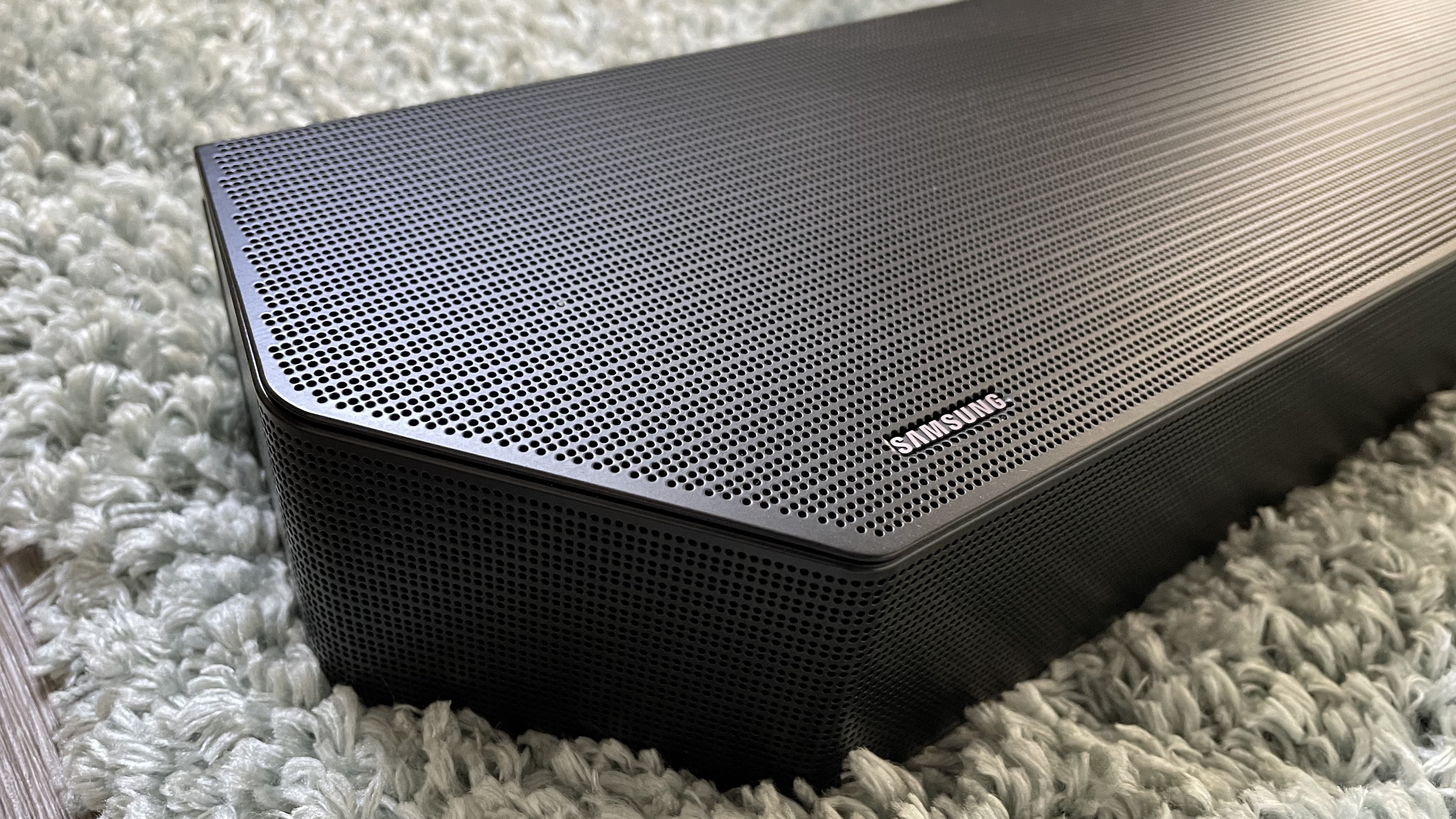
Samsung HW-Q990B review: sound quality
- Class leading sound stage creation
- Huge power and impact
- Bass and detail galore
The Q990B does a peerless job of creating a full-blooded Dolby Atmos soundstage in your living room.
Every one of its 16 channels of sound is made to count – especially as the integrated new auto-calibration system does an excellent job of balancing the channels out without any manual input from yourself. You feel completely wrapped within a bubble of sound that extends right down the sides of your seating position, right around the back of your head, and even, in a startlingly joined-up fashion, right over your head.
Audio channels: 11.1.4
Audio format support: Dolby Atmos, DTS:X
Connectivity: 1x HDMI eARC, 2x HDMI passthrough, 1x digital optical, 1x ethernet, Wi-Fi, Bluetooth
Extra features: Wireless Dolby Atmos, Samsung Q-Symphony (both with compatible Samsung TVs)
Creating such a seamless hemisphere of sound is key to delivering a convincing Dolby Atmos sound experience. After all, the key point about Dolby Atmos is that it’s a so-called object-based sound format, where sounds are placed in a carefully crafted ‘3D’ audio space rather than just steered to specific speakers. So if your sound system can’t create that 3D space properly, it can’t then place specific sound effects within that space correctly.
Of course, last year’s Q950A also delivered what was, at the time, a peerless Atmos sound stage. The Q990B, though, does it even better. Partly, I think, because of the extra self-calibration tools it carries, but also because of the improved design of the newer system’s rear and subwoofer speakers.
Where the rears are concerned, the improved angling of their up-firing drivers helps their sound connect with the up-firing effects from the main soundbar better, creating a more convincing and consistent sense of overhead sound. The subwoofer, meanwhile, still hits the huge (by soundbar standards) depths of rumble that we’ve become used to hearing from Samsung’s flagship soundbars, but the Acoustic Lens helps its sound spread throughout your room more evenly, and its tone feels smoother across a wider range of volumes and depths.
This extra refinement together with the Auto EQ calibration feature means the Q990B’s bass, while always impressively present, hardly ever draws too much attention to itself, instead always feeling just like another well-balanced part of the wider mix.
The main soundbar component, meanwhile, continues to deliver the magical combination of immense detailing, huge power, spectacular impact and remarkably effective channel steering that we heard from last year’s awesome Q950A.
There’s a clear sense of verticality to its sound, for instance, extending (very unusually for a soundbar system) to some genuine overhead sounds. The side and front side drivers not only fill in the side of the 3D audio hemisphere, rounded out by the side-firers built into the rear speakers, but also present sound effects transitioning from front to back or side to side with a smoothness and conviction I haven’t heard from any other soundbar.
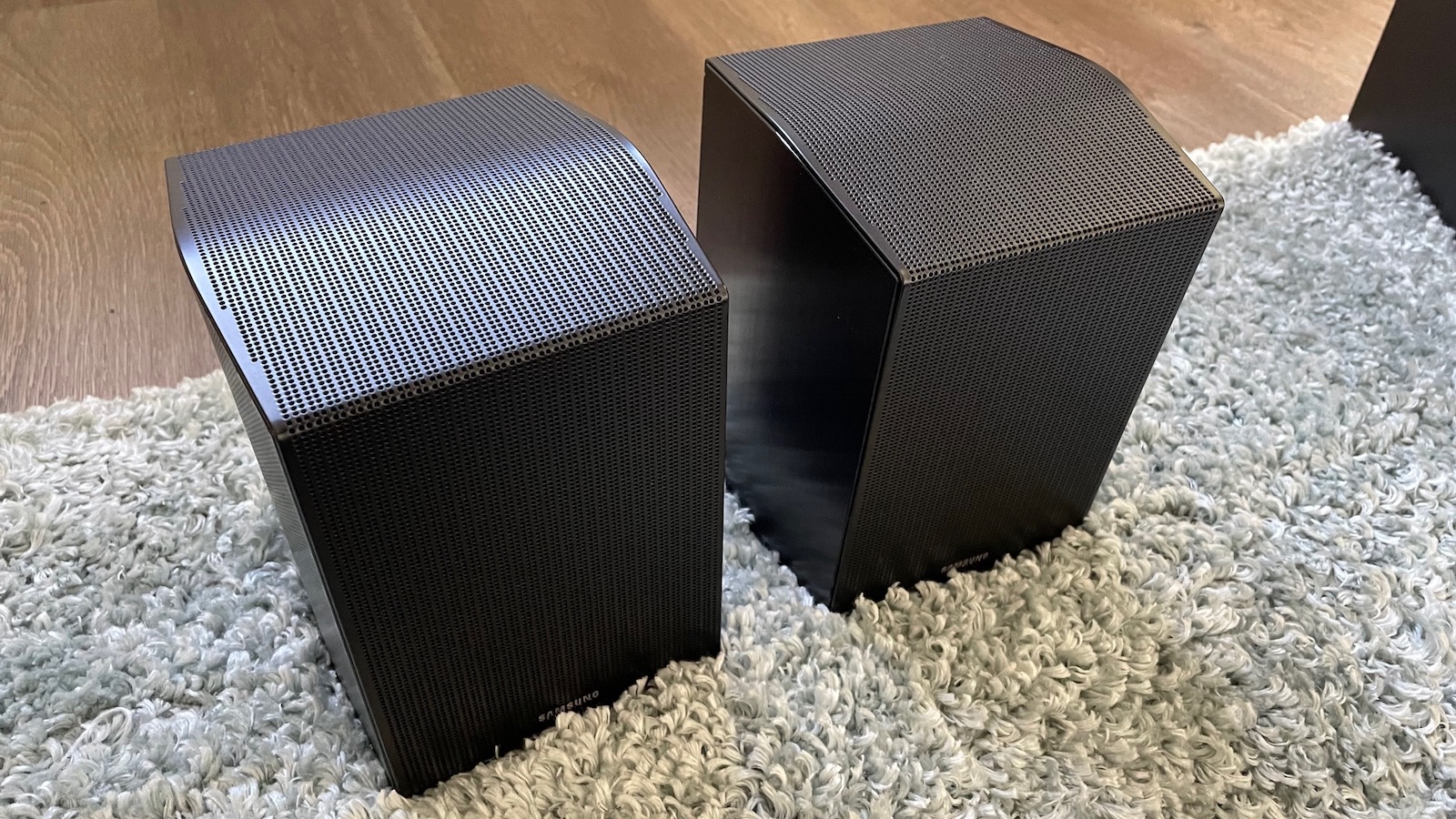
Dialog is always clear, but also effectively contextualized, and voices sound as if they’ve being slightly lifted vertically, to marry up with the onscreen action.
Even though none of its components bar, perhaps, the subwoofer are unusually large for the subwoofer world, the Q990B system can shift astonishing amounts of air, delivering enough power to achieve huge, room-filling volume levels, without breaking down into harshness or distortion.
There’s plenty of nimbleness within this massive sound, too. By which I mean that it can dial itself back for very subtle scenes built more on detail and ambience just as happily as it can crank itself up to meet the demands of even the densest, most dynamic action movie climax. It also manages to deliver hard impact sounds with consistent authority no matter how dense the rest of the mix might be.
Other than finding its handling of DTS:X soundtracks a little less dynamic and exciting than its Dolby Atmos performance, I struggled to find any significant fault with the Q990B’s movie performance. As with numerous previous Samsung flagship soundbars, though, it’s not on quite such firm ground when it comes to music.
While native Dolby Atmos mixes are enjoyable and vocals tend to be handled well, with stereo tracks the subwoofer that sounds so beautifully integrated with movies can sometimes become a bit baggy, drawing too much attention to itself. Dense, layered tracks can sound slightly congested, too. This is hard to reconcile with a soundbar that delivers such fearsome power and dynamics with movies, but there you go.
Fortunately, the Q990B has a solution of sorts in the shape of its Adaptive sound preset. This is the one that remixes tracks to take advantage of the soundbar’s full array of channels, and it delivers surprisingly enjoyable results. Much better than those of the similar mode on last year’s Q950A. It’s so clever about how it redistributes even a vanilla stereo mix’s elements around your living room, in fact, that at times you can almost think you’re listening to a properly mastered Dolby Atmos mix.
The Adaptive preset likely won’t appeal to hi-fi purists, but it balances the musical elements better than the straight stereo Music mode, as well as making the sound appear much less congested.
- Sound quality score: 5/5
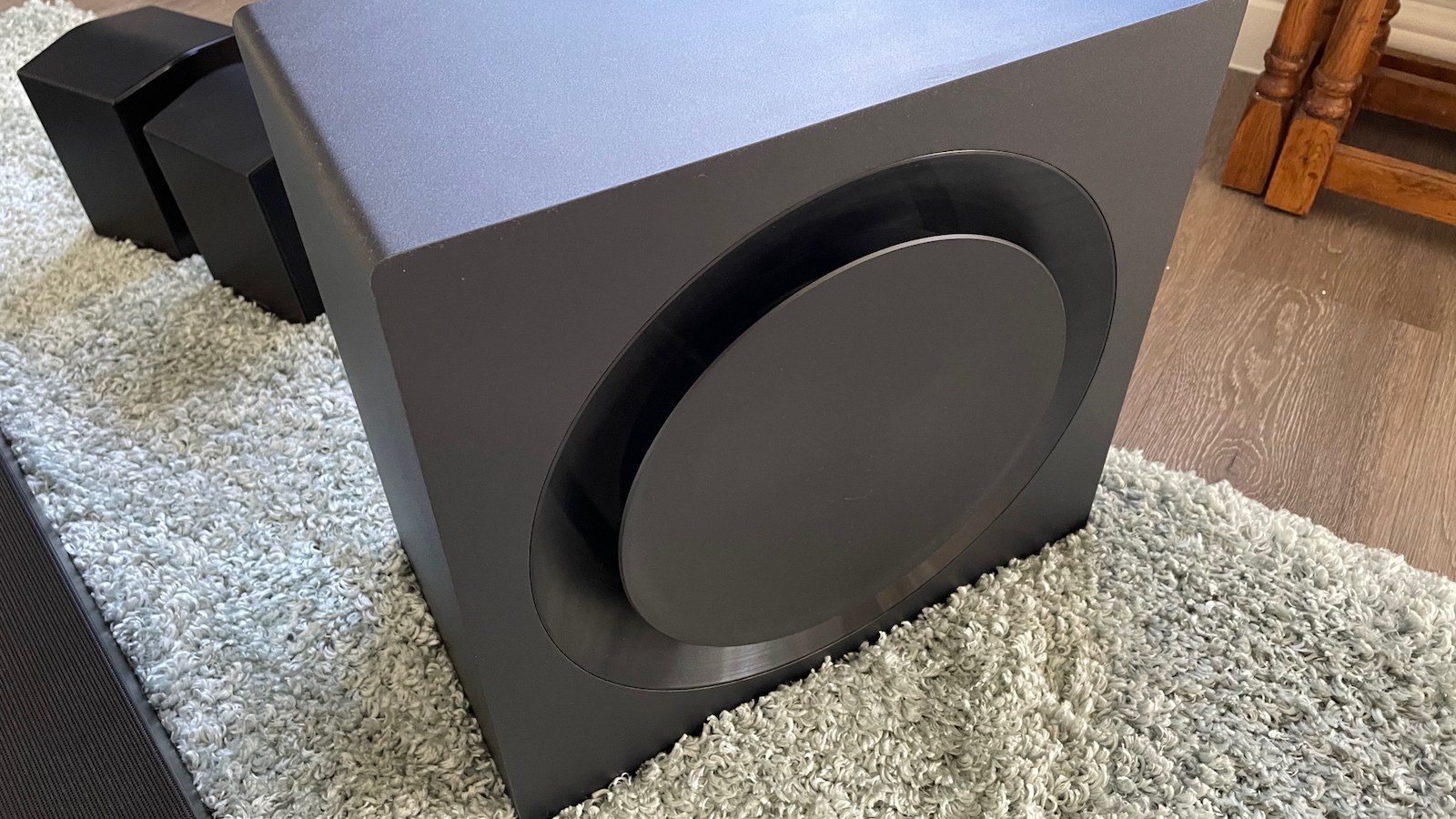
Samsung HW-Q990B review: design
- Four component package
- 11.1.4 configuration
- Acoustic Lens subwoofer
The single most important thing about the Q990B’s design is that it comprises four components: The main soundbar, a subwoofer, and a pair of rear speakers. All of which bar the subwoofer carry multiple separate channel drivers each; three in each rear, and nine in the main soundbar.
Samsung has moved away from the felt finish it’s used on its main soundbar and rear speakers for the past couple of flagship soundbar generations, returning to the all-metal grilled finish of the more distant past. This gives it a harder, less domesticated look, but on balance I prefer it. Not least because it doesn’t attract dust like the felt finish.
The main soundbar is slender enough to fit under most TVs without obscuring the picture, and the rears will easily fit on a typical bookshelf. The subwoofer is hefty, for sure. But its new Acoustic Lens fitment makes it look at least a bit cool, while the extra dispersive qualities of its design make it even easier to tuck out of sight under a sideboard or next to the sofa.
The single best thing about the Q990B’s design, though, is the way it sees Samsung mercifully returning a little LED info screen to the soundbar’s front edge, where you can see it while sat on your sofa, rather than repeating the heinous error of the previous two flagship soundbar generations where the LED was sadistically placed on the top edge where you had to – shock, horror – be standing to read it.
- Design score: 4/5
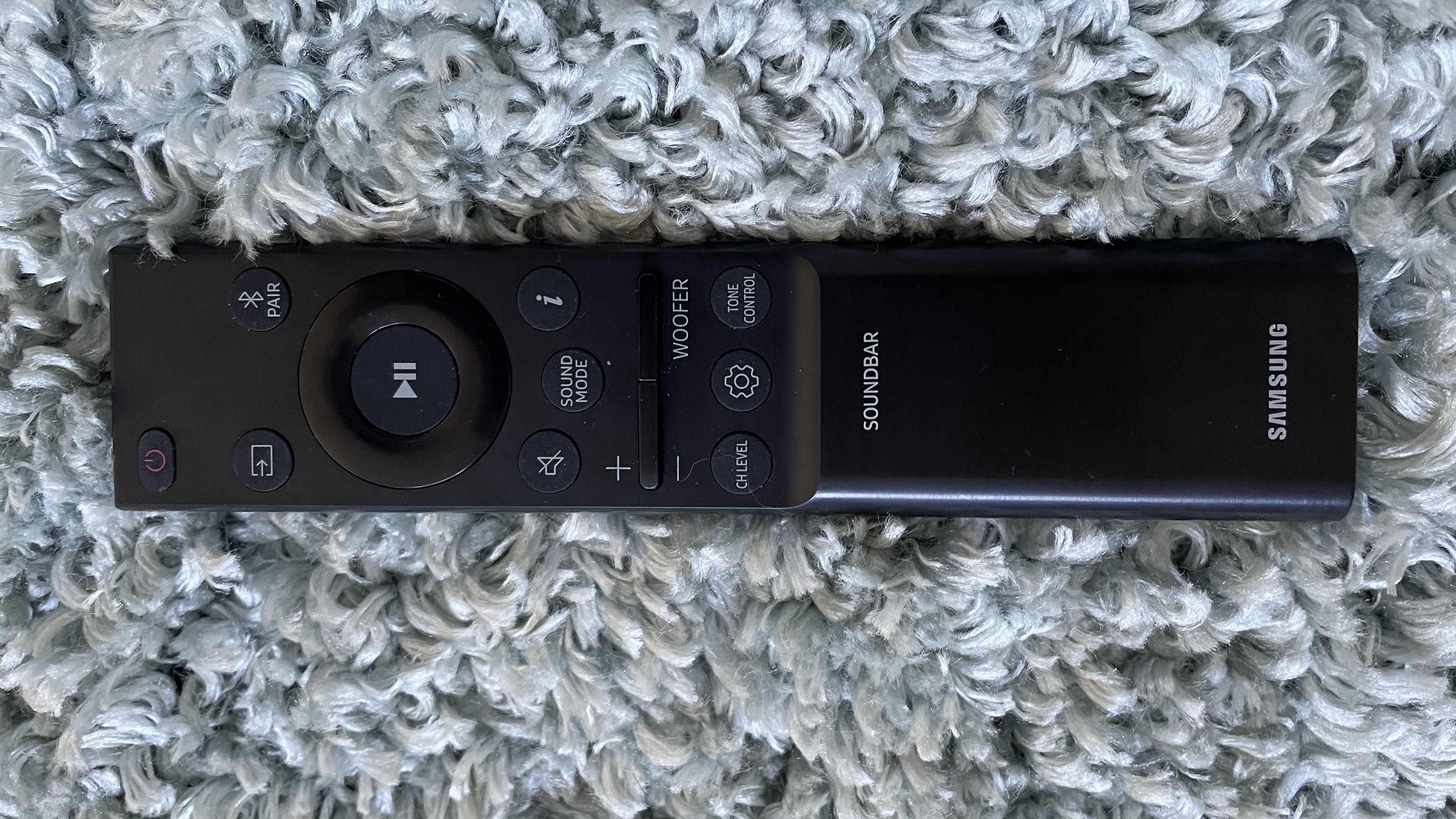
Samsung HW-Q990B review: usability and setup
- All components auto connect with no problem
- Subwoofer can be placed pretty much anywhere
- Auto-cal, front-mounted LED and ergonomic remote make day to day use easy
For a soundbar that consists of four component parts, it’s hard to see how the Q990B could be much easier to get up and running.
All four parts are wireless, so there’s no need to run cables between them, and during our lengthy time with the system, all four elements never failed to automatically find and connect with each other right away, with no manual input required from us.
The new Space Fit auto-calibration system is a huge boon to set up too. Especially as once you’ve run it once, it re-checks itself every day. This is so much better than the process of trying to balance channels manually that’s been required with previous Samsung soundbars.
Day to day use is pretty straightforward, too. The front-mounted LED makes it easy to track volume levels, sound formats and the input you’ve got selected, and the remote control keeps buttons to an easy to follow minimum. Plus you can control the soundbar via the more visual interface of Samsung’s Smart Things app, and there’s built-in Alexa voice control support if you’d rather have a nice chat.
The only thing that costs the Q990B a mark is that it could label its sound modes more logically, and that you need to switch between different sound presets quite regularly to keep getting the most enjoyable results with different types of music.
- Usability and set up score: 4.5/5
Samsung HW-Q990B review: value
- A high-end soundbar with a price to match
- Still feels like good value for what it offers
- Rivals a decent and likely more expensive separates system
There’s no hiding the fact that the Samsung HW-Q990B is expensive when you can get pretty decent soundbars for a third of the price. But they don't sound anything like this, and can't create anything that comes close to the total envelope of sound you get here.
And compared with the sort of very respectable separates-based surround sound speaker systems that the Q990B deserves to be compared with, the price doesn’t look unreasonable at all. You do get four seriously impressive separate elements for your money, after all, and those four units do collectively deliver a record-breaking 11.1.4 channels of sound, with no additional AV receiver unit or cabling required.
It’s worth remembering, too, that there are a few single-unit soundbars out there that cost considerably more than the Q990B even though their lack of rear speakers means they can’t create a fully fledged Dolby Atmos experience.
If you love movies and can stretch your budget far enough, the Q990B is a truly outstanding soundbar. Peerless, in fact, when it comes to delivering the full immersive qualities and power of Dolby Atmos mixes.
- Value score: 4/5
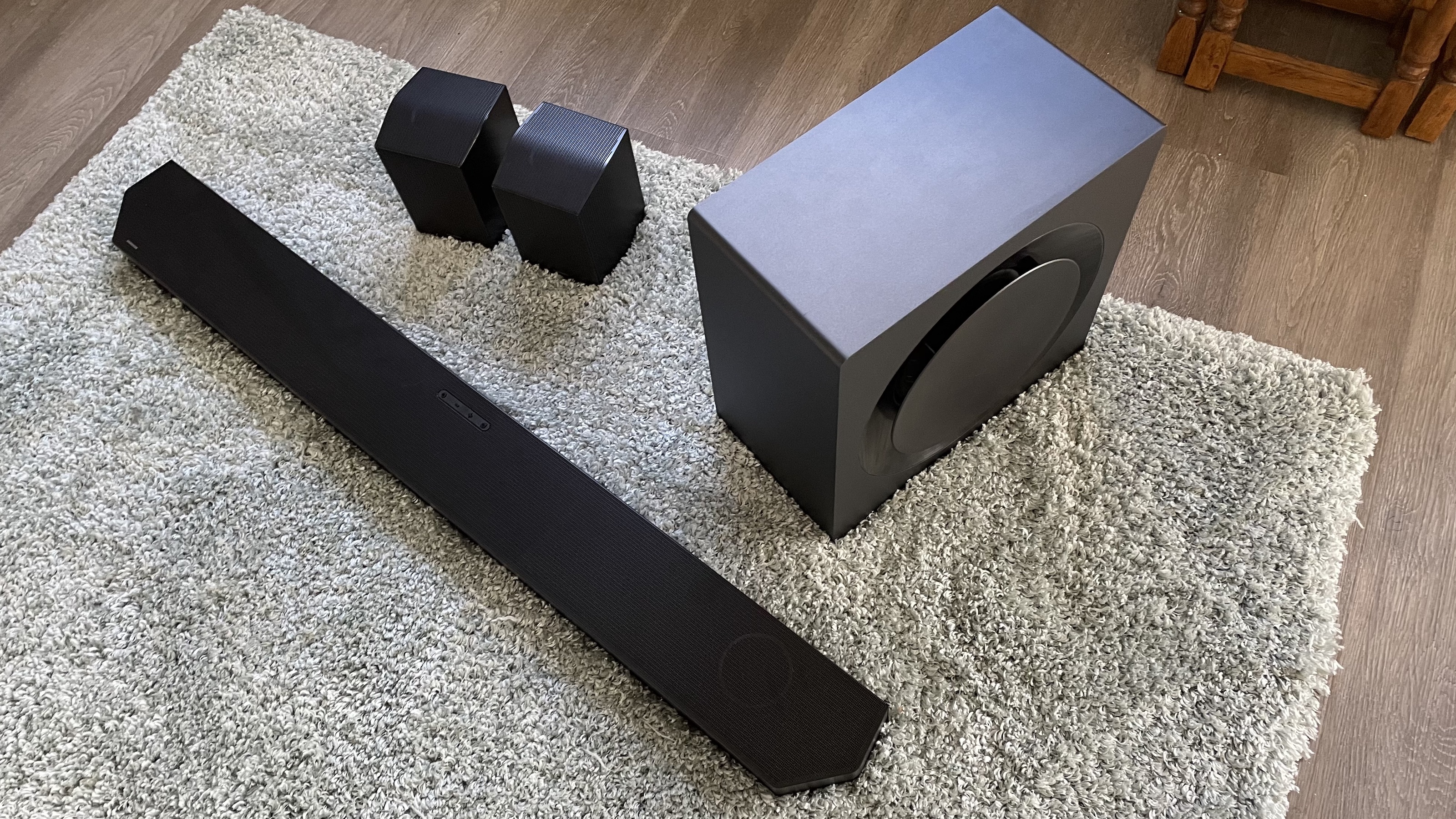
Should I buy the Samsung HW-Q990B?
| Attributes | Notes | Rating |
|---|---|---|
| Features | Excellent audio tech, and some very smart extras… but not 4K 120Hz video passthrough. | 4.5/5 |
| Sound quality | Astounding 3D sound – you've never heard anything like it from such a simple system. | 5/5 |
| Design | Fairly compact, for such big sound, and new grille is easier to dust. | 4/5 |
| Usability and setup | Useful screen on the front, and good options, but there's a lot of sound modes. | 4.5/5 |
| Value | It's expensive, but you could actually pay more and get less immersive sound. Worth the cost. | 4/5 |
Buy it if…
You want movie soundtracks to actually sound cinematic
The Q990B’s massive power and dynamic range join forces with surprising detail and clarity for such an aggressive beast to deliver full movie soundtrack dynamics like no other soundbar we’ve heard.
You want a full surround-sound experience
The rear speakers included with the Q990B are definitely not just there for show. Boasting three channels each, they contribute to a uniquely (for a soundbar) complete and immersive Dolby Atmos experience.
Don’t buy it if…
You’re a stereo music snob
While the Q990B handles native Dolby Atmos music well and upmixes stereo to full surround effectively, there are better performers out there when it comes to native stereo music.
Four components is too much for you
If you want a soundbar in its purest, tidiest, one component only form, then obviously the Q990B’s external sub and rear speakers may be more than you want to deal with.
Also consider
Devialet Dione
If you’d rather go for a single-unit soundbar and can stretch the budget even further, the Devialet Dione is an outstanding option. You get very clear sound and genuinely big bass, which is rare for this kind of soundbar. There are no rear channels and no HDMI passthrough, though.
Sonos Arc
If you wish the Samsung was better and handling music, then the Sonos Arc is probably the option for you. It's excellent for hi-fi, as well as being dynamic and impressive with movies. Though if you add the Sonos Sub and some rear speakers, you'll be rivalling the Samsung for price, but without as immersive side and overhead sound (the Sonos maxes at 5.1.2 channels).
Samsung HW-Q950A
At the time of writing, perhaps the biggest rival to the Q990B is last year's Q950A, which can be found for much, much cheaper, but still delivers that dome of sound. We've talked in this review about how the new model improves on the old… but you can find the older version for up to 40% cheaper than the new one, and that makes it hard to argue with.
John has been writing about home entertainment technology for more than two decades - an especially impressive feat considering he still claims to only be 35 years old (yeah, right). In that time he’s reviewed hundreds if not thousands of TVs, projectors and speakers, and spent frankly far too long sitting by himself in a dark room.
